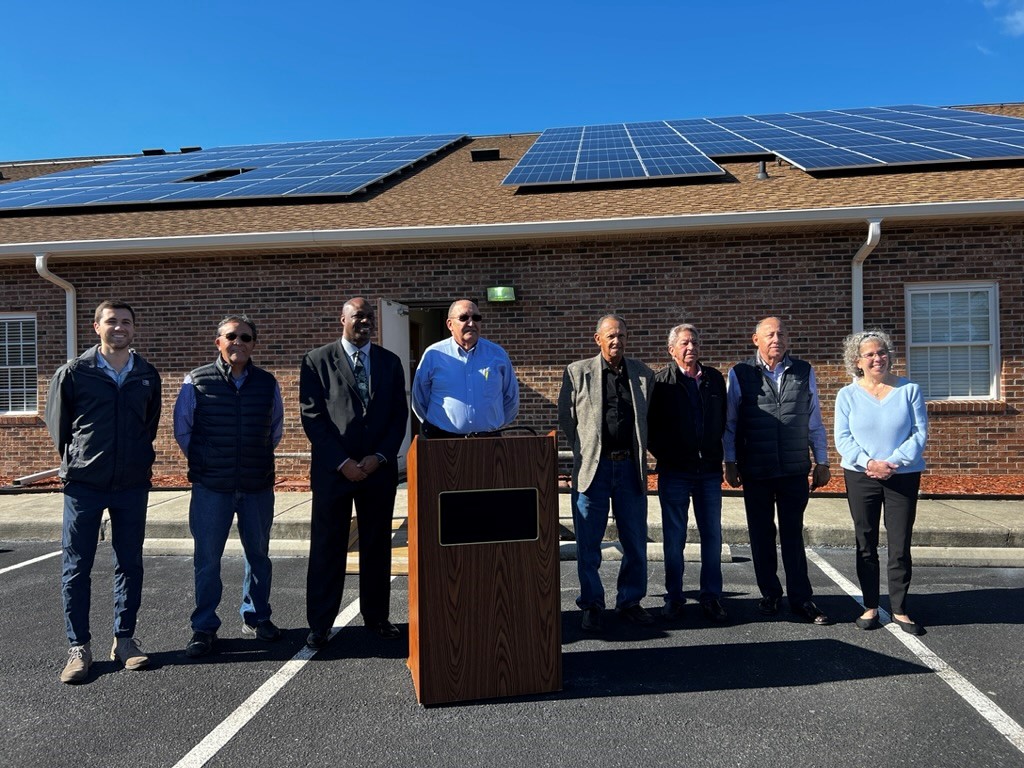Squeaky Clean Energy Podcast Episode 87: Short, Sweet, and a Solar Lease
On a fairly recent episode of the Squeaky Clean Energy Podcast, we travel out to Pembroke, North Carolina (NC), to learn more about a commercial PV system installed for the Lumbee Regional Development Association (LRDA). Eagle Solar & Light, along with Sunwealth, put together a financial package for the nonprofit, allowing them to install the solar system with no upfront costs via a monthly lease. Learn more about why solar leasing hasn’t taken off yet in NC and what the loss of the Duke Energy rebate program means for disadvantaged communities. What unrealized benefits do scalable solar leasing models offer marginalized communities across the state?

Financing the LRDA Solar Installation
“This is a great model where Sunwealth provides a no-upfront-cost financing option. They’re just paying us an ongoing lease cost, and it’s a fixed price such that they’re able to create energy savings as utility costs increase,” explained Jordan Swett, Sunwealth’s project finance manager. Sunwealth is a clean energy investment firm providing financing for projects like this for the Lumbee Regional Development Association (LRDA). And for groups like the LRDA, having the ability to install solar helps to save money on their utility bills and funnel those savings into additional services for disadvantaged members of the Lumbee tribal community throughout Robeson, Hoke, Scotland, and Bladen counties.
In many cases with this leasing model, the system will produce more power than the cost of the lease, generating net savings for the customer. In this case, the LRDA expects to see $8,200 in utility-bill savings in the first year while offsetting more than 1,000 metric tons of carbon dioxide.
Swett is Lumbee himself and shared, “I’m a proud Lumbee citizen, and it’s meaningful that I get to work on this project because education and community development are really important to my family.” The LRDA’s mission is to reinvest in the community, and Swett said he appreciated that this solar project supports the mission by unlocking additional funds for employment, housing, and other economic development programs.
Eagle Solar & Light is one of few installers in the state offering this financing model, which was authorized under the bipartisan state bill, HB589 (2017). While the bill opened the door for a new financing option, it did set limits on the total capacity of solar that could be added to the grid under a lease agreement. That total capacity limit is currently 1% of all solar installations, which makes it incredibly difficult to build and scale a business model. Eagle Solar & Light has capitalized on this opportunity though and found a corner of the market that stands to especially benefit – nonprofits.
Laura Combs, senior sales associate at Eagle Solar & Light, explained how she found this opportunity. She said that as an environmental planner, understanding social and environmental injustices have been part of her career from the start. In thinking about these injustices and working with nonprofits, she thought, “Who can I help the most? Who has been left out of clean energy?” She quickly realized that tribal communities have often been overlooked and needed the opportunity that Eagle Solar & Light and Sunwealth combined could bring via solar leasing.
James Harden, the recent executive director of the LRDA, said it made sense to take on the project for two reasons: (1) to protect the planet, and (2) to save money on energy bills that can be reinvested in programs. In addition to a solar lease, LRDA also received an upfront rebate from Duke Energy which totaled over $56,000. Combined, the rebate and the leasing model made it an easy choice for the LRDA.
Increasing Solar Access for Other Marginalized Communities
Unfortunately, the Duke Energy nonprofit solar rebate expired earlier this year. Combs explained that the loss of this rebate reduces solar access for low-income and marginalized communities.
Still, federal funds could help nonprofit organizations receive direct payments for solar projects, increasing solar opportunities for marginalized communities. The Inflation Reduction Act expanded the investment tax credit for renewable energy projects, which nonprofits can recoup in the form of direct payments.
Dr. Henry McKoy, who leads the Office of State and Community Energy Programs at the U.S. Department of Energy, said that President Biden’s Justice 40 initiative prioritizes federal funds for marginalized communities. The initiative’s goal is for 40% of the overall benefits of federal investments to flow to communities facing environmental injustices. “There’s more money in this space right now than we’ve seen in a long time,” he said.
The Lumbee are one of the first tribes to install solar in NC, but they likely won’t be the last. Greg Richardson, executive director at the NC Commission of Indian Affairs, said, “My hope is that efforts here in Robeson County will be taken by other tribal communities in the state.”
NC House Bill 535
NCSEA is supporting House Bill 535, which would raise the solar leasing cap to 10% of the previous five-year average of peak demand for the utility. It was filed by Representative Kyle Hall on March 29, 2023. If passed, this policy would become effective on July 1, 2023. As of May 22, 2023, it has passed the House.
A higher solar leasing cap would provide more opportunities for low-income and tribal communities in NC to access solar. They could then invest their energy savings into other beneficial community initiatives.
Thank you to all of the clean energy leaders who spoke on Episode 87. To learn more about solar leasing and solar access for disadvantaged communities, listen to the full episode of the Squeaky Clean Energy Podcast.

